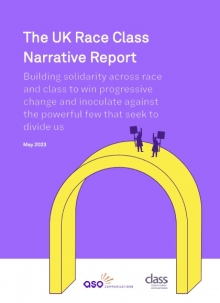A new report from the think tank CLASS sets out how and why the left is failing with its messaging and what needs to be done to transform its approach into a positive, inclusive narrative.
The UK Race Class Narrative Report, subtitled “Building solidarity across race and class to win progressive change and inoculate against the powerful few that seek to divide us” was written by CLASS Research Officer Raquel Jesse and launched this week.
The report found that despite the diversity of working class people, they share everyday experiences of precarity, prejudice and a lack of power and place. Yet the narratives adopted by our political enemies use racism and classism to divide working class people in ways with which we are all too familiar. The Report notes:
“The divide-and-rule strategy is to racialise the working class as a white cultural minority, presenting them as the victims of immigration and advances in racial and gender equality. Rhetorically, such framing obscures from view the essential questions of inequality, power, wealth and oppression. Indeed, rather than reject class, certain Conservative politicians proclaim to be ‘the champions of the white working-class’. Meanwhile, progressives are portrayed as class traitors – ‘the woke mob’ – obsessively focused on race and ignoring the ‘real’ working-class.”
How should progressives respond? The problem is, says the Report, that the way progressives talk about race and class neither reflects nor resonates with the ethnically diverse working class. The Report says:
“We are losing the debate. Instead of promoting progressive ideas and neutralising this divisive narrative, our analysis of communications from progressive actors exposes how our side falls into several common traps laid by our opponents. For example, we often legitimise damaging frames, such as echoing the sentiment that Britain is in the midst of a war of cultural values; we mimic our opponents by counterposing race and class and siloing issues. We often repeat our opponents’ language to negate it, but we are giving their story more airtime by doing so.”
Instead, the Report proposes messages that come directly from listening to working class people and are more persuasive, mobilising, and resonant with people across race and class around shared interests. These messages communicate the truth that there is a small elite making decisions against the common interest and seek to unite people to secure our mutual interests – a better future. They expose and delegitimise the enemy’s method of division and racialised scapegoating as a divisive distraction.
The Report starts from the fact that most people take a progressive outlook on key social issues.
- 58% think that people of colour face greater barriers to economic success than white people.
- 60% think that focusing on and talking about race is necessary to move toward greater equality.
- 60% think that if the working class struggles in our society it is because the rules are rigged against it.
- 65% think that wealthy people in the UK are wealthy because they were given more opportunities than others.
- 71% think that the best thing the government can do for the economy is to provide the healthcare, education and services people need.
These are positive starting points. Coalition building, the Report argues, is about identifying shared interests amongst people. In the past, groups often worked together towards common goals in a context much more polarised than the present. “Today we urgently need to propagate an alternative shared narrative that reflects modern class interests, shared across differences of race and place, and holds to account those who continue to act against these interests.”
The Report’s research involved conducting a language analysis to map the narrative landscape of existing stories and frames around the themes of race and class. It looked at over 500 sources from politicians, media outlets, spokespeople, academics and social media. Researchers spoke to almost 50 working-class people from all walks of life and conducted 18 in-depth interviews. They trialled messaging ideas around values, beliefs, challenges and solutions.
The guiding principle of the work was intersectionality – the theoretical framework that acknowledges that human experiences, struggles and societies are shaped by multiple social dimensions – race, class, gender, nationality, sexuality, faith, disability, etc. It also prioritised authenticity: the research had to be based on the views of working class people themselves.
There are important lessons in this Report not only for how the left communicates, but also for the lines used by the Labour leadership. The Report sets out clear, accessible alternatives to the muddled messaging that dominates the progressive case.
CLASS Director Ellie Mae O’Hagan argues in her Foreword: “A compelling story about who we are, the shared struggles we face, and the change we can make when we join together is a vital tool to unite working class people. Let’s use it.”

The full report is here. A summary of its findings is here.

